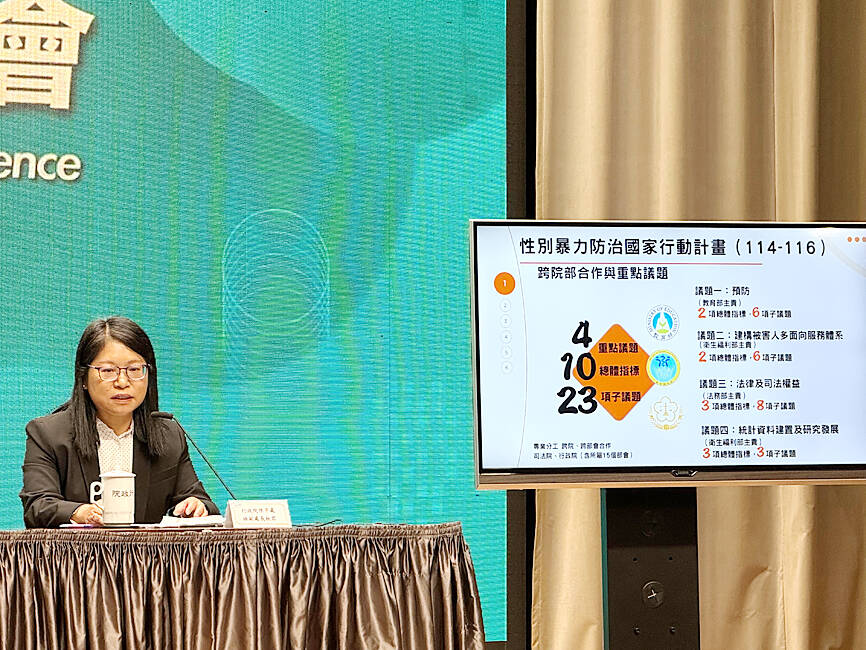The Cabinet yesterday approved the first nationwide action plan to combat gender-based violence, which would mandate education on preventative measures for students at least four hours annually and extend the statute of limitations on child sexual abuse cases.
Department of Gender Equality Deputy Director Lin Chiu-chun (林秋君) said that the action plan would include prevention, construction of a multifaceted service system for victims, laws and judicial rights, and data construction and research.
The actions taken to deal with the four major issues would fall into three categories: protecting children and teenagers, increasing gender inclusivity, and preventing digital or online gender-based violence, she said.

Photo: Chung Li-hua, Taipei Times
In an effort to protect children and teenagers, students at the high-school level or below would be required to take at least four hours of classes on gender-based violence prevention every year to heighten their awareness of bodily autonomy, Lin said.
Meetings, workshops and mixed media would be used to enhance principals’ and teachers’ abilities to recognize and tackle gender-based violence, as well as provide counseling and protection, she said.
Authorities would supervise the removal of blind spots in campus safety, and the improvement of soft and hard facilities, Lin said.
Regarding laws and judicial rights, forensic interviewing would be introduced to help children leverage judicial resources, while the statute of limitations on child sexual abuse cases would be extended, she said.
To increase gender inclusivity, a scheme to double gender-friendly restrooms would be implemented, Lin said, adding that gender diversity would be promoted in schools and society to eliminate discrimination, with medium and long-term resources to be deployed.
Judicial personnel’s gender sensitivity, and professional knowledge and skills would be enhanced to enable a gender-friendly judicial environment, Lin said.
To prevent gender-based violence digitally or online, which became increasingly complicated with the development of the Internet, training for prevention personnel would be bolstered nationwide, she said.
The idea of digital or online gender-based violence prevention would not only be promoted in schools and communities, but would also be taught to owners and employers of media or online platforms, so that all parties involved would be held responsible and such wrongdoings could be prevented from the source, Lin said.
People could also seek help from the Sexual Images Processing Center, which would ask online platforms to take down their sexual images or restrict the access to defend their rights, she said.

RESOLUTIONS DEBATE: Taiwan’s allies said that UN and WHA resolutions cited by China and other nations ‘do not determine Taiwan’s participation in WHO activities’ A proposal to invite Taiwan to this year’s World Health Assembly (WHA) was rejected on Monday, resulting in Taipei’s absence from the annual meeting for a ninth consecutive year, although partners spoke up for Taiwan’s participation at the first day of the meeting. The first agenda item after the opening was a “two-on-two debate” on a proposal to invite Taiwan to participate at the WHA as an observer. Similar to previous years, two countries made statements in favor of the proposal, while two others expressed their opposition. Philippine Secretary of Health Teodoro Herbosa, president of the 78th WHA, accepted the WHA General Committee’s

Palauan President Surangel Whipps Jr arrived in Taiwan last night to kick off his first visit to the country since beginning his second term earlier this year. After arriving at Taoyuan International Airport at around 6:30 pm, Whipps and his delegation were welcomed by Minister of Foreign Affairs Lin Chia-lung (林佳龍). Speaking to gathered media, the Palauan leader said he was excited and honored to be back in Taiwan on his first state visit to Taiwan since he was sworn in this January. Among those traveling with Whipps is Minister of State Gustav N. Aitaro, Public Infrastructure

Premier Cho Jung-tai (卓榮泰) on Friday laid out the Cabinet’s updated policy agenda and recapped the government’s achievements ahead of the one-year anniversary of President William Lai’s (賴清德) inauguration. Cho said the government had made progress across a range of areas, including rebuilding Hualien, cracking down on fraud, improving pedestrian safety and promoting economic growth. “I hope the public will not have the impression that the Cabinet only asked the legislature to reconsider a bunch of legal amendments,” Cho said, calling the moves “necessary” to protect constitutional governance and the public’s interest. The Cabinet would work toward achieving its “1+7” plan, he said. The

Nvidia founder and CEO Jensen Huang (黃仁勳) hosted a dinner in Taipei last night with key Taiwanese suppliers to celebrate the successful mass production of the company’s new Blackwell AI systems. Speaking to the media earlier yesterday, Huang thanked Nvidia’s Taiwanese partners for their contributions to the company’s ecosystem, while also sharing his plans to meet with Taiwan Semiconductor Manufacturing Co (TSMC) founder Morris Chang (張忠謀). In response to rumors that Nvidia will launch a downgraded Hopper H20 chip for China in July, Huang dismissed the reports, saying, “That is not true.” He clarified that there